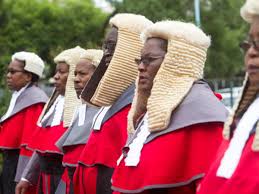
JUDGES TOP LIST OF BRIBE RECIPIENTS, POLICE LEAD IN BRIBE REQUESTS, NBS REPORT
A report published on the National Bureau of Statistics website has shown that a total of N721 billion ($1.26 billion) was paid in cash bribes to public officials in 2023.
The report followed the findings of the United Nations office on Drugs and Crimes survey in partnership with the National Bureau of Statistics.
The report titled “Corruption in Nigeria; Patterns and Trends” noted that an average cash bribe paid was N8,284. This represents an increase from the 2019 nominal figure out at N5,754.
In total it was estimated that $1.26 billion was paid in bribes to public officials in 2023.
In terms of amount, judges received the highest average amount per bribe in the year with a figure of N31,000, Customs and Immigration service received N17,800, members of the armed forces received N16,600, land registry officials received N11,700, police officials N10,400.
Findings of the report also noted that 46% of public officials under government employment offered one form of bribe or the other to get employed and facilitate their recruitment.
This development was said to be 1.5 times the share found in a survey held in 2019.
The report further stated that six out of 10 successful candidates in the public sector admitted to using nepotism, bribery or both to improve their chances of recruitment.
While bribery was said to be widespread in the country, the police were accused of more prevalence in terms of bribery.
The report noted that 9% of persons who had contact with police officials were asked for some form of bribe.
Four percent of those who came in contact with nurses and doctors were asked for bribes, 3% of teachers/lecturers, 6% of persons who came in contact with public utility officials were also said to have been asked for some form of bribe or the other.
Three percent of persons who came in contact with teachers and lecturers were asked for one form of bribe or the other, 4% of those who came in contact with Federal Road Safety Corps officials, and 2% of people who came in contact with vehicle inspection officials were asked for bribes.
It was further reported that highly educated persons were more likely to pay bribes than people with no formal education.Nigerian institutions are widely regarded as being among the most corrupt globally, with a pervasive culture of corruption and impunity hindering effective governance and undermining public trust.

